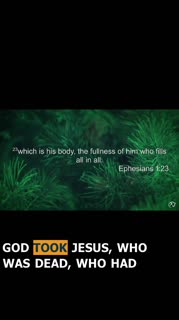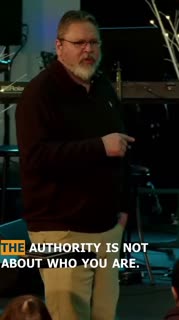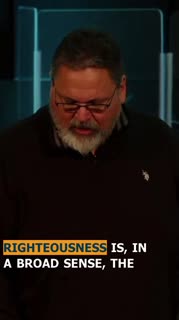Embracing Our Authority in Christ
Devotional
Sermon Summary
Bible Study Guide
Sermon Clips
1. "We set apart the first week of the year, and we basically devote it to God. We say, okay, God, this is, I mean, every day should be right. Every day is His day. But we take the first, we just say, God, we want to just worship you. We want to be in your presence. And so what we do is every evening at 7 o'clock, we get together here, and we have a Holy Ghost meeting. What's a Holy Ghost meeting? Well, if you don't know what a Holy Ghost meeting is, you should come and be a part of it. Because bottom line, we don't come with an agenda." ([00:47:37] (29 seconds)
)
2. "God took Jesus, who was dead, who had paid for our sins, who was separated from him, he took them in that obedience, and he raised him from the dead. That's what we talked about last week. God raised Jesus from the dead. God, in his authority, God in his power, in his might, he sent Jesus to die for our sins. And we're going to talk a lot about that today, about righteousness. He died for our sins. And he was obedient, Ephesians says, even unto death." ([00:56:50] (33 seconds)
)
3. "Real death is separation from God. That's what happens. Hell is. Hell has all the other stuff with it, but hell is really separation from God. So there are people alive right now who are living in a living hell because they're separated from God. And their life is full of all kinds of pain and suffering and, you know, loneliness and, I mean, everything else. That once you are born again, once your spirit is born again, then you are now in fellowship with God." ([00:59:28] (37 seconds)
)
4. "You receive what he did. You say, Jesus, I receive what you did on the cross. Your death, your burial, your blood shed for me. That right there. I choose to accept that free gift of salvation, that free gift of forgiveness. And we're going to talk about this. It's a gift. He gave it. He wants to give it to every single person. He doesn't want. Jesus says, I hope that I wish that none would be lost." ([01:00:48] (26 seconds)
)
5. "It's because you are in Christ. You are in Christ. If you're born again today, if you're born again, you are in Christ, whether you believe it or not, whether you understand it or not. I want you to understand it. That's why we're just, I'm hammering this today. I'm going to hammer in Christ today. I'm just, you're going to hear this so much because it is not because of what you think you are. It's not because of where you believe you are. It's not how you feel today. It's about the truth that if you are born again, I don't care who you are, what you've done. If you are born again, you are, right this moment, in Christ." ([01:05:34] (39 seconds)
)
6. "Authority is the power or right to give orders, make decisions, and enforce obedience. That's really important. The power or right to give orders, to make decisions, and to enforce obedience. A person or an organization having power or control in a particular, typically political or administrative sphere. We're talking about the spiritual sphere, which actually controls everything." ([01:09:45] (37 seconds)
)
7. "The authority is not about who you are. The authority is about who you are in. He's in a uniform. He's in a uniform. He's in a police car. He has the authority. No, you can blow by him. Good luck. One guy did. Well, almost did. See, there's a guy right on my tail, and when I pulled over, he's like, I even told Deb, I said, I wonder how long it's going to take before he catches on, and all of a sudden, pulls over in the right lane. Why? Because he has authority. You have authority. You have authority." ([01:18:00] (40 seconds)
)
8. "Faith is a function of the authority, not their feelings. Authority in the kingdom flows from righteousness. The enemies of authority are guilt, condemnation, and low self-esteem. These feelings have the goal of stripping you of confidence, authority, and faith. We must learn to understand our righteousness in Christ. Otherwise, our faith will be weak and ineffective." ([01:20:17] (28 seconds)
)
9. "Righteousness is, in a broad sense, the state of him who is as he ought to be. This sounds kind of like a word, but it's not. It's kind of legal, you know, legal. It is the state of him who is how he ought to be. Okay? Righteousness, the condition acceptable to God. God has said, I'll tell you what, I love you." ([01:23:38] (32 seconds)
)
10. "It is because you are in Christ Jesus that you are. You are righteous. You are righteous. You are in right standing with God. You're going to be right standing with God even three seconds after you sin. This afternoon, tomorrow, the day after, a month from now, a year from now. It doesn't matter. Your position with God does not change at all, at all, at all, at all, ever, because of sin. It doesn't matter. The only thing that happens because of sin. Is your mind starts going." ([01:32:21] (35 seconds)
)
Ask a question about this sermon
)
2. "God took Jesus, who was dead, who had paid for our sins, who was separated from him, he took them in that obedience, and he raised him from the dead. That's what we talked about last week. God raised Jesus from the dead. God, in his authority, God in his power, in his might, he sent Jesus to die for our sins. And we're going to talk a lot about that today, about righteousness. He died for our sins. And he was obedient, Ephesians says, even unto death." ([00:56:50] (33 seconds)
)
3. "Real death is separation from God. That's what happens. Hell is. Hell has all the other stuff with it, but hell is really separation from God. So there are people alive right now who are living in a living hell because they're separated from God. And their life is full of all kinds of pain and suffering and, you know, loneliness and, I mean, everything else. That once you are born again, once your spirit is born again, then you are now in fellowship with God." ([00:59:28] (37 seconds)
)
4. "You receive what he did. You say, Jesus, I receive what you did on the cross. Your death, your burial, your blood shed for me. That right there. I choose to accept that free gift of salvation, that free gift of forgiveness. And we're going to talk about this. It's a gift. He gave it. He wants to give it to every single person. He doesn't want. Jesus says, I hope that I wish that none would be lost." ([01:00:48] (26 seconds)
)
5. "It's because you are in Christ. You are in Christ. If you're born again today, if you're born again, you are in Christ, whether you believe it or not, whether you understand it or not. I want you to understand it. That's why we're just, I'm hammering this today. I'm going to hammer in Christ today. I'm just, you're going to hear this so much because it is not because of what you think you are. It's not because of where you believe you are. It's not how you feel today. It's about the truth that if you are born again, I don't care who you are, what you've done. If you are born again, you are, right this moment, in Christ." ([01:05:34] (39 seconds)
)
6. "Authority is the power or right to give orders, make decisions, and enforce obedience. That's really important. The power or right to give orders, to make decisions, and to enforce obedience. A person or an organization having power or control in a particular, typically political or administrative sphere. We're talking about the spiritual sphere, which actually controls everything." ([01:09:45] (37 seconds)
)
7. "The authority is not about who you are. The authority is about who you are in. He's in a uniform. He's in a uniform. He's in a police car. He has the authority. No, you can blow by him. Good luck. One guy did. Well, almost did. See, there's a guy right on my tail, and when I pulled over, he's like, I even told Deb, I said, I wonder how long it's going to take before he catches on, and all of a sudden, pulls over in the right lane. Why? Because he has authority. You have authority. You have authority." ([01:18:00] (40 seconds)
)
8. "Faith is a function of the authority, not their feelings. Authority in the kingdom flows from righteousness. The enemies of authority are guilt, condemnation, and low self-esteem. These feelings have the goal of stripping you of confidence, authority, and faith. We must learn to understand our righteousness in Christ. Otherwise, our faith will be weak and ineffective." ([01:20:17] (28 seconds)
)
9. "Righteousness is, in a broad sense, the state of him who is as he ought to be. This sounds kind of like a word, but it's not. It's kind of legal, you know, legal. It is the state of him who is how he ought to be. Okay? Righteousness, the condition acceptable to God. God has said, I'll tell you what, I love you." ([01:23:38] (32 seconds)
)
10. "It is because you are in Christ Jesus that you are. You are righteous. You are righteous. You are in right standing with God. You're going to be right standing with God even three seconds after you sin. This afternoon, tomorrow, the day after, a month from now, a year from now. It doesn't matter. Your position with God does not change at all, at all, at all, at all, ever, because of sin. It doesn't matter. The only thing that happens because of sin. Is your mind starts going." ([01:32:21] (35 seconds)
)










